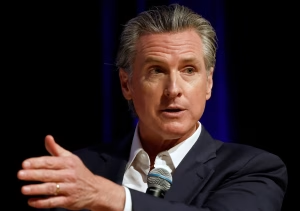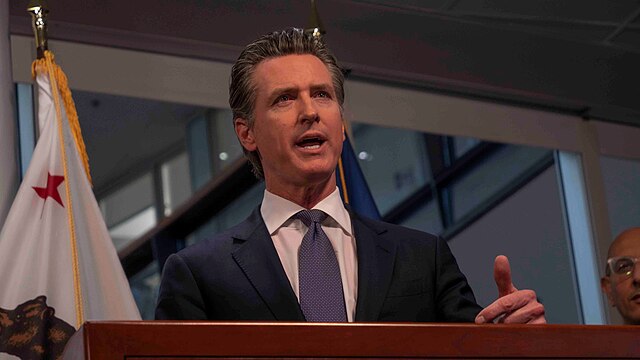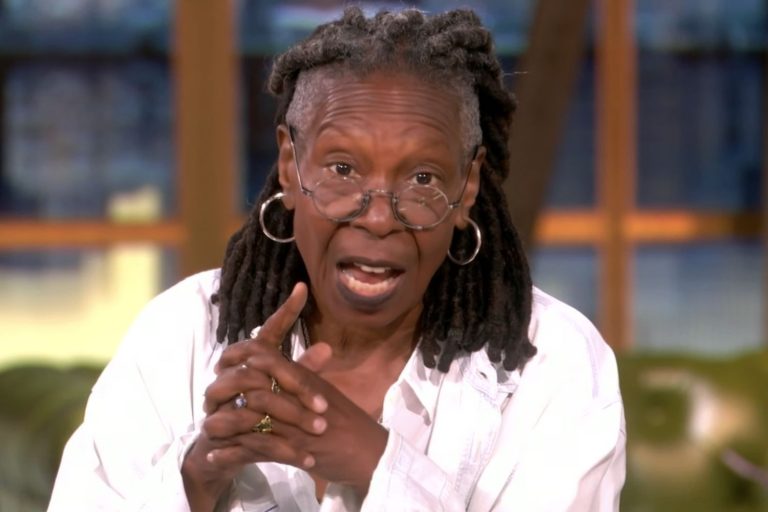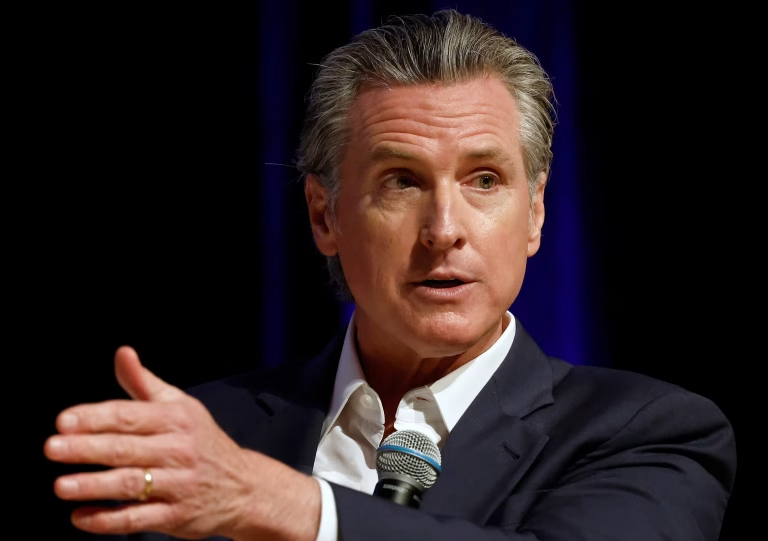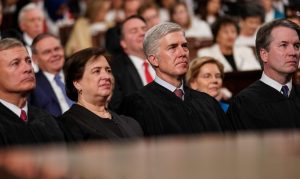California Governor Gavin Newsom has issued what he called a “declaration of independence” from the Trump administration, framing it as a symbolic stand for democratic values ahead of the upcoming “No Kings” protests scheduled for the weekend.
In a video statement released online, Newsom urged participants to remain peaceful while portraying the demonstrations as a defense of constitutional principles.
“No kings. A declaration of independence against the tyranny, against lawlessness in the context that there was no rule of law,” Newsom said. “It was the rule of king. And I think increasingly people are waking up to the rule of law in this country increasingly appearing to be the rule of ‘Don.’”
Newsom’s remarks appeared to draw a parallel between former President Donald Trump’s leadership style and authoritarian rule, calling on Americans to reflect on the ideals of the nation’s founders.
“I hope it’s dawning on people how precious this moment is and what’s at stake,” he added. “And so I hope people put a stake in the ground, take the opportunity and time to participate this weekend—but again, do so peacefully, with a deep realization of the consequences and what the founding fathers were all about.”
Protests Framed as a “Symbolic Stand”
The “No Kings” demonstrations are expected to take place in several cities across California, with organizers describing the events as a “defense of democracy” and a statement against what they see as the erosion of institutions.
Critics, however, accuse Newsom and other Democratic leaders of politicizing the protests for partisan gain, arguing that the rhetoric risks escalating tensions at a time of deep national division.
The rallies are anticipated to draw both supporters and opponents of the governor, and law enforcement agencies have been preparing for potential confrontations, though officials continue to emphasize the importance of peaceful demonstration.
https://twitter.com/CAgovernor/status/1978912564034834661
Newsom’s Broader Political Context
The governor’s defiant tone comes as tensions between state and federal leadership continue to grow. Newsom has positioned himself as a leading national voice in opposition to Trump’s policies—particularly on issues of climate, immigration, and civil rights.
This week, he signed a controversial new law creating a state agency dedicated to programs for descendants of enslaved Americans, marking one of the most significant steps in California’s ongoing debate over reparations.
The measure, known as Senate Bill 518, establishes the Bureau for Descendants of American Slavery within the California Civil Rights Department. The bureau will include three divisions:
-
Genealogy, responsible for verifying eligibility based on lineage;
-
Education and Outreach, which will oversee public awareness campaigns; and
-
Legal Affairs, tasked with compliance and enforcement.
Newsom will appoint a deputy director to oversee the bureau, which will be funded through future legislative appropriations and eligible for state, federal, or private funding sources.
A Push for Reparations Policy
The bureau’s creation follows several years of advocacy and heated debate. A prior reparations task force—established in the wake of the George Floyd protests—recommended direct payments exceeding $1 million per eligible person, along with additional measures such as repealing Proposition 209, which bans affirmative action in California.
It is notable, however, that California was never a slave-holding state. Newsom has acknowledged this, emphasizing that the initiative is aimed at addressing systemic discrimination and generational inequities rather than compensating for slavery itself.
Initially, Newsom distanced himself from direct cash payments, calling the issue “about much more than cash.” Yet over time, he has signed multiple measures tied to reparations-related initiatives, including:
-
A formal state apology for slavery issued in 2024.
-
Legislation providing non-cash benefits such as housing assistance, educational opportunities, and community investment programs.
Political and Legislative Challenges
Despite progress, the governor has faced pushback from both sides. Progressive activists have criticized him for moving too slowly, while conservatives argue that the state’s financial challenges make new social programs irresponsible.
Disagreements within the California Legislative Black Caucus previously delayed the creation of a dedicated reparations agency. Newsom vetoed an earlier version of the bill, citing the lack of an administrative body capable of managing the program—a gap now addressed by Senate Bill 518.
The new law, according to Newsom’s office, fills that administrative void and sets the stage for a more structured approach to implementing reparations policy.
The Genealogy Division will be central to the process, responsible for confirming applicants’ eligibility by tracing ancestry to enslaved individuals or people classified as “contraband” prior to 1900.
The bill also includes privacy protections for any genetic or personal information collected, ensuring such data remains confidential and shielded from public disclosure.
Symbolism and Timing
Observers say the timing of Newsom’s remarks—just days before the “No Kings” protests—appears carefully calibrated to reinforce his broader message about democracy and equality.
Political analysts note that Newsom has increasingly positioned himself as a national voice of resistance to Trump, while balancing his responsibilities as California’s governor amid growing fiscal and political challenges at home.
His statement invoking the Declaration of Independence underscores that strategy, casting the protests as a moral and civic stand rather than merely a political one.
Still, critics on the right say the rhetoric risks inflaming partisan divides and alienating moderate voters. They argue that comparing an American president to a monarch oversimplifies complex issues and diminishes opportunities for dialogue.
A National Backdrop of Political Unrest
The protests come amid broader national unrest and a string of federal shutdown debates in Washington. Across the country, tensions between state leaders and the federal government have intensified over issues ranging from border policy to energy regulation.
The “No Kings” protests, while focused primarily on symbolism, are part of a larger wave of demonstrations expected to unfold across major U.S. cities this fall. Organizers say their message centers on the idea that “no individual is above the law”, echoing themes from both the Founding Fathers and modern political movements.
In California, police departments have issued joint statements emphasizing that public safety and peaceful assembly will be their top priorities.
Newsom’s Closing Message
As the weekend approaches, Newsom’s statement continues to circulate widely online, drawing strong reactions from both supporters and critics.
He closed his video by urging participants to uphold the spirit of civic duty while avoiding confrontation.
“This is about reminding ourselves what it means to live in a democracy,” Newsom said. “To participate, to speak up, but to do so peacefully and with purpose.”
The protests, he added, are “an opportunity to reaffirm the ideals that make this country what it is — not a kingdom, but a republic.”

Emily Johnson is a critically acclaimed essayist and novelist known for her thought-provoking works centered on feminism, women’s rights, and modern relationships. Born and raised in Portland, Oregon, Emily grew up with a deep love of books, often spending her afternoons at her local library. She went on to study literature and gender studies at UCLA, where she became deeply involved in activism and began publishing essays in campus journals. Her debut essay collection, Voices Unbound, struck a chord with readers nationwide for its fearless exploration of gender dynamics, identity, and the challenges faced by women in contemporary society. Emily later transitioned into fiction, writing novels that balance compelling storytelling with social commentary. Her protagonists are often strong, multidimensional women navigating love, ambition, and the struggles of everyday life, making her a favorite among readers who crave authentic, relatable narratives. Critics praise her ability to merge personal intimacy with universal themes. Off the page, Emily is an advocate for women in publishing, leading workshops that encourage young female writers to embrace their voices. She lives in Seattle with her partner and two rescue cats, where she continues to write, teach, and inspire a new generation of storytellers.

